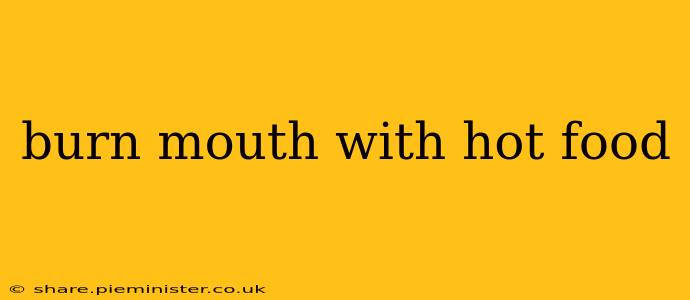Burning your mouth on hot food is a common, albeit unpleasant, experience. From a piping hot cup of coffee to a surprisingly spicy chili, we've all been there. This guide will walk you through immediate first aid, when to seek medical attention, and how to prevent future mishaps.
What to Do Immediately After a Mouth Burn
The first few minutes after a burn are crucial. Your immediate actions can significantly impact the severity and healing time.
-
Cool it down: The most important step is to cool the burned area. Avoid ice, as it can further damage the tissue. Instead, rinse your mouth with cool (not cold) water or milk. Milk can help soothe the burn and reduce inflammation. You can also hold a cool, wet washcloth against your mouth for a few minutes.
-
Avoid home remedies: Contrary to popular belief, butter, toothpaste, or other home remedies are not recommended. These can actually trap heat and potentially worsen the burn. Stick to cool water or milk.
-
Don't touch the burn: Resist the urge to touch or rub the burned area. This can increase inflammation and the risk of infection.
-
Pain relief: Over-the-counter pain relievers like ibuprofen or acetaminophen can help manage pain and inflammation. Always follow the dosage instructions on the packaging.
How Long Does a Mouth Burn Last?
The duration of a mouth burn depends on the severity. Mild burns typically heal within a few days to a week, with discomfort gradually subsiding. More severe burns, characterized by blistering or significant pain, may take longer to heal and could require medical attention.
When to See a Doctor
While most mouth burns heal without complications, it's crucial to seek medical attention if you experience:
- Severe pain: Pain that is unbearable or doesn't improve after a few days.
- Blistering: Large or multiple blisters are a sign of a deeper burn.
- Significant swelling: Swelling that affects your ability to swallow or breathe.
- Fever: A fever suggests a possible infection.
- No improvement after several days: If the burn isn't showing signs of healing after a week, consult a doctor.
What Causes Mouth Burns?
Mouth burns are most commonly caused by consuming or touching extremely hot food or beverages. This can include:
- Hot drinks: Coffee, tea, soup, etc.
- Hot food: Pizza, chili, etc.
- Spicy food: While not technically a burn, spicy foods can cause a similar burning sensation.
How Can I Prevent Mouth Burns?
Preventing mouth burns involves a little mindfulness and caution:
- Test the temperature: Before taking a sip or bite, test the temperature of your food or drink with a spoon or a small amount on the back of your hand.
- Slow down: Take smaller bites and sips, allowing your mouth time to adjust to the temperature.
- Be mindful of children: Supervise children carefully around hot food and drinks.
- Use caution with microwaved foods: Microwaved food can heat unevenly, leading to hot spots that can cause burns. Stir food thoroughly before consuming.
- Let food cool: Allow hot food and beverages to cool down slightly before consuming them.
What are some home remedies for a minor mouth burn?
As mentioned earlier, avoid most home remedies. While cool water and milk are excellent options, other substances can hinder the healing process or even cause harm. It's best to stick to simple cooling methods and over-the-counter pain relief if needed.
Can a mouth burn cause blisters?
Yes, a mouth burn can cause blisters, especially if the burn is severe. Blisters indicate a deeper burn and are a sign that you should seek medical attention.
How long does it take for a mouth burn to heal?
The healing time for a mouth burn varies depending on the severity. Minor burns might heal within a few days, while more significant burns can take several weeks. Persistent pain or lack of improvement warrants a visit to a healthcare professional.
This information is for general knowledge and does not constitute medical advice. Always consult a healthcare professional for any concerns about your health.
